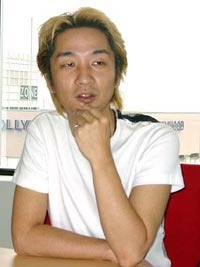Interview with Akira Yamaoka (Music 4 Games)Date published: 2003.01.08
M4G: When did you first know you wanted to create sound and music? Yamaoka: I think it was when I was around 19 years old or so. I used to be in a band, but I had difficulty working together with other people, so it made it harder to collaborate with other people to perform music. Around that time, I found that I could create music with a personal computer, and I purchased it. That was the starting point. I was so happy that I no longer needed to complain over the bass or synthesizer sounds of someone else. (laughs) M4G: Are you trained, self-taught or a mixture of both? Yamaoka: I am self-taught. Thus, I cannot read notes and I don't know musical theory, either. I once tried to take a piano lesson, wishing that I could be popular among girls, however, it was so boring. I quit it in one week. (laughs) M4G: Which instruments do you play? Yamaoka: I am not really sure about the extent of "to play," however, when it comes to a guitar, I can jam it. I love 7-string guitar the most. M4G: How did you get involved with the video game industry? Yamaoka: To me, things which can kill your life are: women, money, video games. This is my theory. I love video games to that extent. (laughs). I sought a job that would take me into games, and I'm lucky I'm here now. M4G: How does your position as a producer on this game challenge or complement your role as an audio composer? Yamaoka: I think it helps. However, I am not really sure whether I can be as great a producer as others. There are great predecessors who have done fantastic work in different fields, such as Charlie Chaplin or Alejandro Amen Bar (the movie director of "The Others"), I cannot be much happier to be doing different things. M4G: When do you find yourself to be the most creative? Is there a particular schedule you follow? Yamaoka: It is basically every day. I don't have a particular schedule to follow. I think it would be really nice if I could wake up, take a shower, sip a cup of coffee and start writing the piano scores while being relaxed...No, this is not the case. The reality is that I work through a series of trial and error to create new stuff. M4G: With so many horror films and other horror games available, how difficult is it to create an original sound? Where do you get your inspiration from? Yamaoka: It is very difficult. As you know, once you get some sort of inspiration, the new stuff will most likely be somehow connected to the original one (the source of the inspiration). It is just a copy and I don't think of it as an original. Thus, you have to create it within yourself. However, the sound that I enjoy listening to everyday might give me some influence instinctively, though. M4G: The music and sound of Silent Hill is almost like another character in the game. Is this an extension of your own personality or an alter ego? Yamaoka: This really is my own personality. This applies to Silent Hill. Other works that I do is all my ego though! (laughs) M4G: Can you describe your thought process for scoring? Yamaoka: Well, it's quite simple... I boot my PC, start the sequencer, and record while I jam on a guitar. Since I don't know how to read notes, it would be a nightmare if a blackout happened! (laughs) M4G: How do you ensure consistency throughout the creation of the soundtrack? Yamaoka: It comes down to the overall balance. This is not a boring CD where it has the opening music in track #1 and the credits at the end. The Silent Hill 3 soundtrack is a concept CD. Thus, my theme was to have the listeners immerse themselves in the sound space from 0:00, to the end of the soundtrack. M4G: Is the Silent Hill 3 soundtrack more interactive or "adaptive" than previous outings? Yamaoka: If I had to choose, I would say it would be somewhere in the middle between the two. There are scenes which make use of the interactive performance and also make use of the adaptive performance. It is really difficult to say which one. M4G: What equipment and facilities do you use to implement your brand of sound and music for games? Are you working with any new technologies? Yamaoka: I am not using any particularly special equipment. Recently, due to the progression of the PCs, you can pretty much create everything on your PC (not necessary to use instruments), so the software you use becomes much more important. I think I use pretty much all of the sound software in the market today. I am using a new technology, however, as one means of performance. I create stuff which incorporates 3D sound. I am confident that the sound from Silent Hill 3 utilizes it very effectively. M4G: How do you see sound in games progressing? Yamaoka: I think that the actual ways of sound are wide in variety. As video game hardware progresses, visual things such as graphic quality are very easily recognized for its progression. However, the sound is not catching up at all. One hope is that realizing the sound effects (3-dimensional sound etc) is coming true, though it might not seem as appealing to the game players (or I suppose I should say it is the lack of sound performance ability, than the lack of appeal). My thought is that rather than progression of the sound, we should change the positioning of the sound within the gaming public or within the music industry. It is change, instead of progression that is needed. There are many things that are still unexplored through the expression of sound which can only be done in games, such as new sound effects utilizing interactivity, etc. M4G: Konami recently announced that, when Silent Hill 3 hits the PlayStation 2 in the US this summer, the game will be accompanied by a 70-minute music soundtrack. What do you think are the benefits of releasing a fully produced CD to the gaming public? Yamaoka: Most of the video game soundtracks are boring and I hate them. They just collect the sound from each scene and put them together on a CD. I don't think video game sound can just be the music. The game must come first. Thus, I would like you to consider this CD as a "drama CD" rather than a "soundtrack CD". This CD uses music from the game and it has recitation of poems, too. In other words, you can listen to it as one story from 0:00 to the end of the soundtrack. Although this is going to be off the topic a little bit, this soundtrack with a concept is a new attempt and I am confident that this is going to extend the experience of the game, Silent Hill. In contrast, if it was just a collection of songs without having any kind of concept, it would be a totally meaningless thing. M4G: Who performs the vocal tracks featured in the soundtrack? Yamaoka: They are artists who reside in L.A. M4G: The Silent Hill soundtracks are widely available as commercial CD releases in Japan. Why do you think game music in Japan is so popular compared to the USA? Yamaoka: I think it is the nature of the video game sound itself. I must say that the sense and ability of these video game sound creators are extremely low. One of the reasons of this low level is that a lot of their motivation does not come from "I want to make some video games!" In fact, the reality is "I used be in a band for a living, but I decided to work in a video game company to see how it is like." Or, "I love cinema music. If I could work on video games, I might be able to get involved with something close to that." Or, "I learned some musical theory in college. I can write some music" etc. The way of expression comes from the bottom or "root" level in creating video game sound. The sound which is created from these people is very far from being recognized and evaluated by many people. I am not saying that this applies to all sound people, but it is a fact that most of them are like this. The reason why game music is accepted more widely in Japan than in the U.S. is because there are more core gamers in Japan than in the U.S. Maybe, the music sense of the Japanese is so unique that it accepts even non-professional sounds! (laughs) I think there are more opportunities to do something new in video game sound and to be evaluated by many people than in other areas. It would be great if we could create a new type of expression through sound, since video games can express music in an interactive way. M4G: What other genres of music do you enjoy listening to? Yamaoka: I think it would be easier if I tell you the genres that I never listen to. (laughs) Drum 'n' bass, Jazz, Japanese Pop, classical music. I never listen to these genres. In contrast, I listen to the other genres on a daily basis. Special thanks to Kaz Nirasawa for translation. |

 The highly anticipated new release in the blockbuster horror series, Silent Hill 3 will ship with a 70-minute music soundtrack. Composed, performed and edited by the game's producer, Akira Yamaoka at Konami Computer Entertainment Tokyo, the soundtrack CD features the game's distinctive musical score as well as four exclusive vocal tracks. We caught up with the composer/producer to discuss the haunting melodies and eerie sounds of the Silent Hill series.
The highly anticipated new release in the blockbuster horror series, Silent Hill 3 will ship with a 70-minute music soundtrack. Composed, performed and edited by the game's producer, Akira Yamaoka at Konami Computer Entertainment Tokyo, the soundtrack CD features the game's distinctive musical score as well as four exclusive vocal tracks. We caught up with the composer/producer to discuss the haunting melodies and eerie sounds of the Silent Hill series.